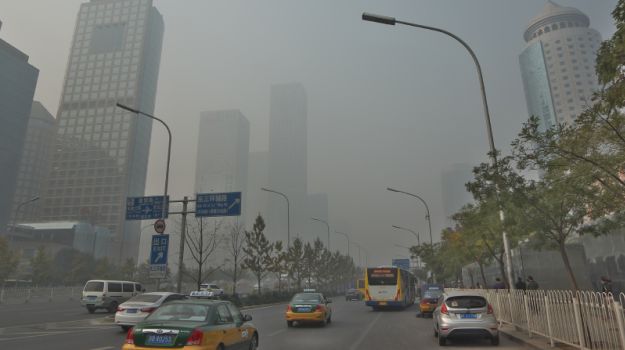Long-term exposure to environmental pollutants is associated with increased risk of mortality for many types of cancer, a new study warns. This study in an elderly Hong Kong population focused on ambient fine particulate matter, or matter with an aerodynamic diameter of less than 2.5 micrometers (PM2.5).Particulate matter is the term for particles found in the air, including hydrocarbons and heavy metals produced by transportation and power generation, among other sources. The researchers found that for every 10 microgram per cubic meter (µg/m³) of increased exposure to PM2.5, the risk of dying from any cancer rose by 22 percent."Long-term exposure to particulate matter has been associated with mortality mainly from cardiopulmonary causes and lung cancer, but there have been few studies showing an association with mortality from other cancers,” said one of the researchers Thuan Quoc Thach from the University of Hong Kong.
"We suspected that these particulates could have an equivalent effect on cancers elsewhere in the body," Thach noted.The study was published in the journal Cancer Epidemiology, Biomarkers & Prevention.The researchers recruited 66,280 people aged 65 or older between 1998 and 2001, and followed them until 2011, ascertaining causes of death from Hong Kong registrations. Annual concentrations of PM2.5 at their homes were estimated using data from satellite data and fixed-site monitors.The researchers found that increases of 10 microgram per cubic meter of PM2.5 were associated with a 42 percent increased risk of mortality from cancer in the upper digestive tract and a 35 percent increased risk of mortality from accessory digestive organs, which include the liver, bile ducts, gall bladder, and pancreas.For women, every 10 microgram per cubic metre increase in exposure to PM2.5 was associated with an 80 percent increased risk of mortality from breast cancer, the study said.The team believe that possible explanations for the association between PM2.5 and cancer could include defects in DNA repair function, alterations in the body's immune response, or inflammation that triggers angiogenesis, the growth of new blood vessels that allows tumours to spread. In the case of the digestive organs, heavy metal pollution could affect gut microbiota and influence the development of cancer.(This story has not been edited by NDTV staff and is auto-generated from a syndicated feed.)
"We suspected that these particulates could have an equivalent effect on cancers elsewhere in the body," Thach noted.The study was published in the journal Cancer Epidemiology, Biomarkers & Prevention.The researchers recruited 66,280 people aged 65 or older between 1998 and 2001, and followed them until 2011, ascertaining causes of death from Hong Kong registrations. Annual concentrations of PM2.5 at their homes were estimated using data from satellite data and fixed-site monitors.The researchers found that increases of 10 microgram per cubic meter of PM2.5 were associated with a 42 percent increased risk of mortality from cancer in the upper digestive tract and a 35 percent increased risk of mortality from accessory digestive organs, which include the liver, bile ducts, gall bladder, and pancreas.For women, every 10 microgram per cubic metre increase in exposure to PM2.5 was associated with an 80 percent increased risk of mortality from breast cancer, the study said.The team believe that possible explanations for the association between PM2.5 and cancer could include defects in DNA repair function, alterations in the body's immune response, or inflammation that triggers angiogenesis, the growth of new blood vessels that allows tumours to spread. In the case of the digestive organs, heavy metal pollution could affect gut microbiota and influence the development of cancer.(This story has not been edited by NDTV staff and is auto-generated from a syndicated feed.)
Advertisement









